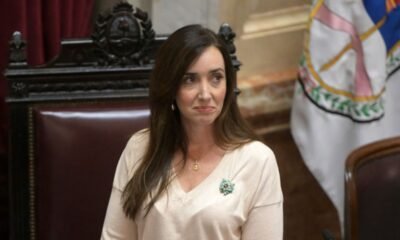INTERNACIONAL
Lawsuit alleges anti-Israel group leaders are ‘Hamas’ foot soldiers in New York City’

A lawsuit filed in the Southern District of New York last month claims the leaders of several radical anti-Israel groups involved in 18 months of disruptive, violent and antisemitic protests on campuses and in the streets of New York City are «accountable for aiding and abetting Hamas’ continuing acts of international terrorism.»
In purported violation of the Antiterrorism Act and the Alien Tort Statue, the defendants are said to have «acted as Hamas’ foot soldiers in New York City,» and may have had foreknowledge of the designated foreign terror organization’s devastating Oct. 7 attacks.
Defendants in the case are Within Our Lifetime and its founder Nerdeen Kiswani, Columbia Students for Justice in Palestine (SJP) and its representative Maryam Alwan, Columbia-Barnard Jewish Voice for Peace (JVP) and its representative Cameron Jones, and Columbia University Apartheid Divest (CUAD) and its representative Mahmoud Khalil, who is currently in custody of Immigration and Customs Enforcement (ICE).
The lawsuit asserts that the associational defendants have «distribute[d] Hamas-created and affiliated propaganda, incite[d] fear and violence, and attack[ed] critical academic, economic, and infrastructure centers in New York City,» as well as having «repeatedly terrorized and assaulted Jews across New York City and on Columbia University’s campus, physically assaulted Columbia University employees, and illegally seized and damaged public and private property.»
DUFFY SLAMS MTA OVER ‘FACT CHECK’ ON ANTI-ISRAEL MOB’S GRAND CENTRAL TAKEOVER
Nerdeen Kiswani, co-founder and leader of Within Our Lifetime, speaks at a demonstration near Columbia University on Feb. 2, 2024, in New York City. (Alexi J. Rosenfeld/Getty Images)
The details of the allegations are thorough. To demonstrate how the defendants «resoundingly and knowingly answered Hamas’ call to action» on and after Oct. 7, the lawsuit cites how the defendants knowingly «obtain[ed] and disseminat[ed]» a Hamas propaganda document, which contained directions created by the Hamas Media Office for spinning the narrative of their deadly attacks. By «painstakingly follow[ing]» the document, the lawsuit alleges defendants «directly responded to, and followed orders from, Hamas.»
The lawsuit also supplies several indicators that defendants may have had foreknowledge of the heinous Oct. 7 attack, to include «a highly suggestive social media post published moments before the October 7 attack began» in which Columbia SJP posted on Instagram «We are back!!» after a months-long hiatus.
On Oct. 7, Kiswani utilized marketing materials that «would not be released until the next day» in a National Students for Justice in Palestine (NSJP) «Toolkit» demonstrating how SJP organizations across the country could support the Gazan «resistance.»

Emaciated Israeli hostages, from left, Ohad Ben Ami, Eli Sharabi and Or Levy are taken by terrorists to a stage before being handed over to the Red Cross in Deir al-Balah in the central Gaza Strip on Feb. 8, 2025. (AP/Abdel Kareem Hana)
Following Oct. 7, Within Our Lifetime promoted a «Day of Rage» in New York City while Columbia SJP and Columbia JVP promoted their own «Day of Resistance.» The mere announcements of these events forced closures of Jewish schools and institutions, and «even forced Columbia University – a non-Jewish institution – to close its campus as a safety precaution,» while Jewish students «were advised to lock their doors and remain inside for their own safety,» according to the lawsuit.
The lawsuit names Khalil as the purported leader of Columbia SJP’s Day of Resistance.
COLUMBIA’S ANTI-ISRAEL PROTESTERS SAY TRUMP PULLING $400 MILLION IN GRANTS FROM UNIVERSITY IS A ‘SCARE TACTIC’
In November 2023, the suit describes how a «’Shut it Down for Palestine’ event descended into – as planned – anti-Jewish and vitriolic hatred and threats,» with speakers shouting «Death to Jews!» and «encourage[ing] Hamas and… comrades across Columbia’s campus to hunt down and assault pro-Israel students.»
The next day, Columbia University suspended Columbia SJP and Columbia JVP, at which time «Khalil and former members and/or organizers of Columbia SJP became leaders of CUAD.» As a result, CUAD «became the primary organizer of the violent and antisemitic protests that would foment terror, sow discord, and disrupt campus life at Columbia for over a year.»
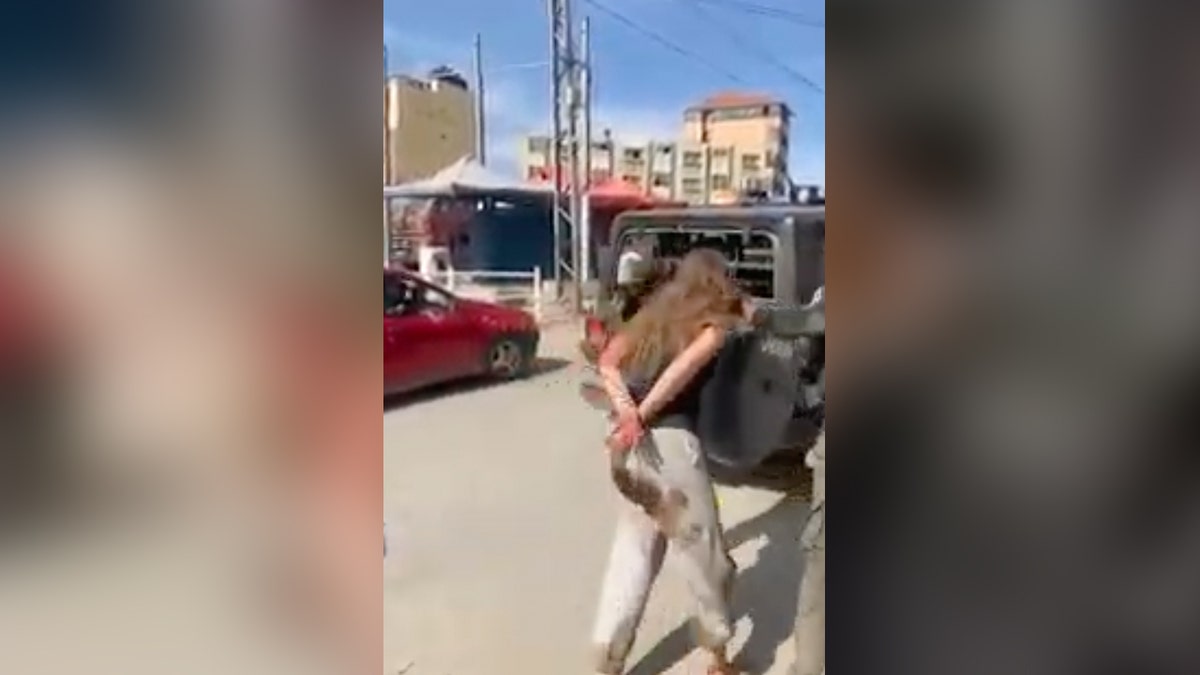
Hamas terrorists kidnap a bloodied Israeli woman into the Gaza Strip. (Hamas-Telegram)
Khalil would later become the lead negotiator of the Columbia encampment, which the lawsuit notes was «well-supplied with identical tents, toiletries, food, and professional signage.» Based on a statement from Shlomi Ziv, a plaintiff in the lawsuit who was held captive by Hamas for 246 days following his kidnapping at the Nova Music Festival, «Hamas and [American Muslims for Palestine (AMP)]/NSJP provided financial, organizational, and other support… for the Encampment.»
Ziv alleges that his «Hamas captors bragged about having Hamas operatives on American university campuses,» and even «showed him Al-Jazeera stories and photographs of protests at Columbia University that were organized by Associational Defendants.»
APPARENT ANTI-ISRAEL ACTIVISTS SPLASH RED PAINT ON HOMES OF JEWISH OFFICIALS AT BROOKLYN MUSEUM
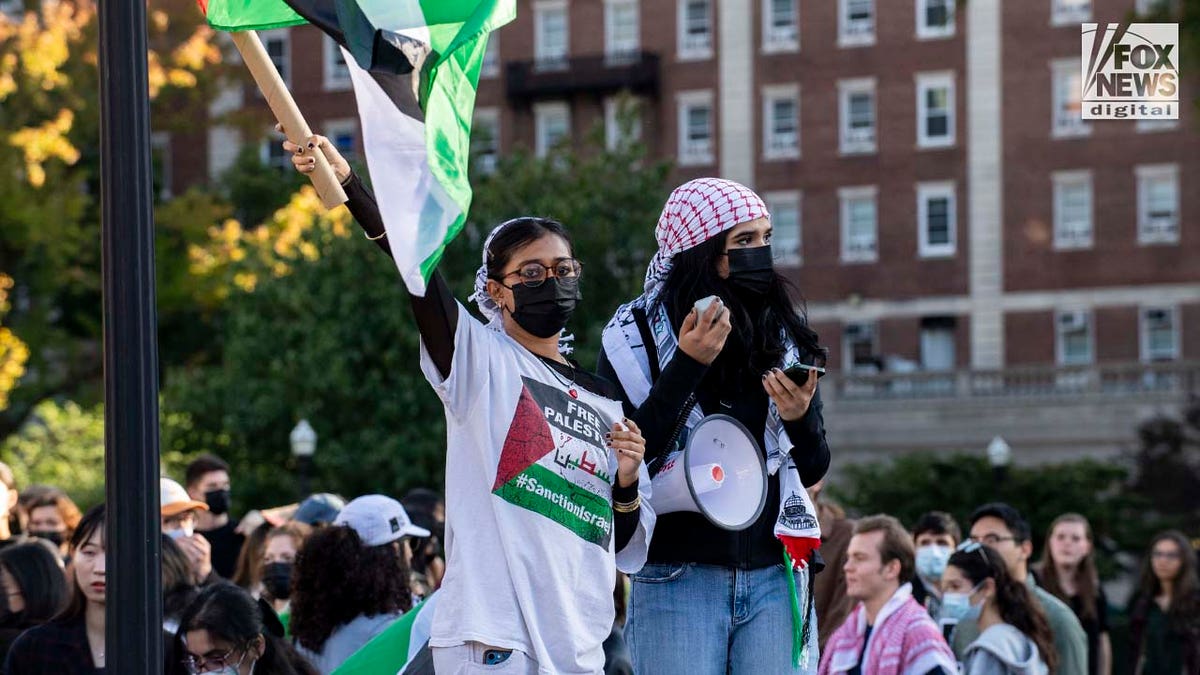
Anti-Israel demonstrators attend a protest at Columbia University in New York City, just days after the Hamas slaughter in southern Israel, Oct. 12, 2023. (Julia Bonavita/Fox News Digital)
Given the «legal chasm between independent political advocacy and coordinating with a foreign terrorist organization to seed pro-terror propaganda throughout America’s largest city,» the lawsuit alleges the defendants’ «actions violate the Antiterrorism Act and the law of nations.»
According to the Jerusalem Post, the National Jewish Advocacy Center, Greenberg Traurig LLP, the Schoen Law Firm, and the Holtzman Vogel Law Firm filed the suit on behalf of plaintiffs who include Ziv, several Columbia University students who have served with the Israel Defense Forces, and a number of American and Israeli citizens whose family members, most of whom are believed dead, remain in Hamas captivity.
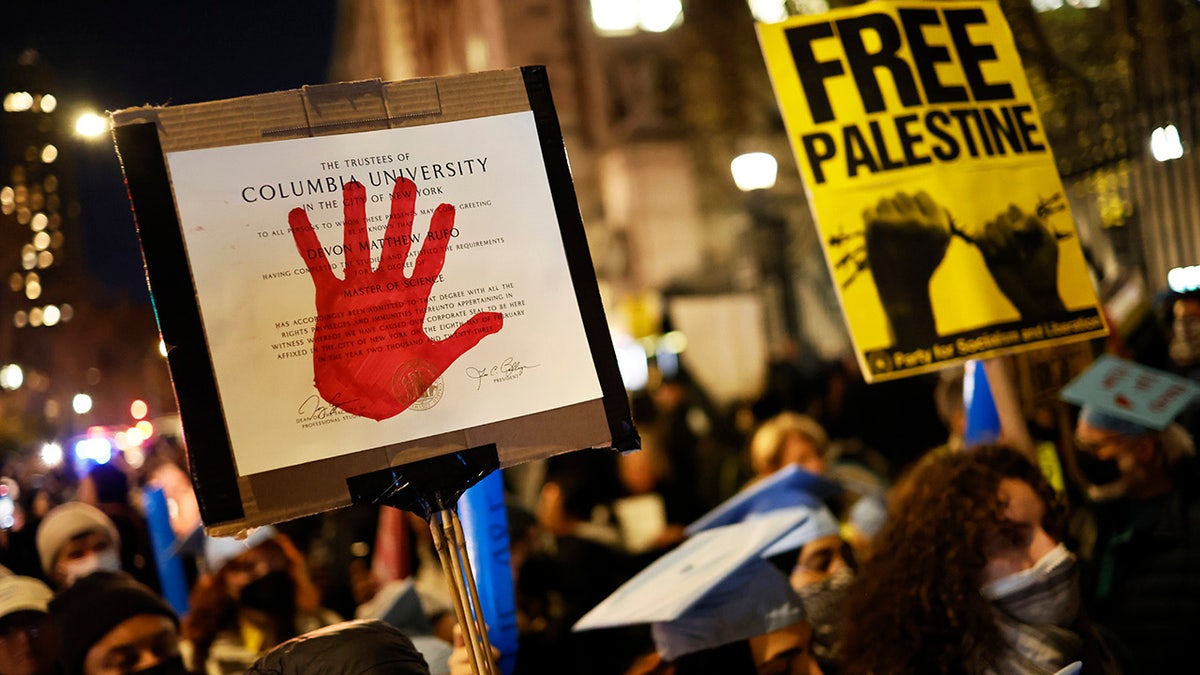
People protest the banning of Students for Justice in Palestine and Jewish Voice for Peace at Columbia University on Nov. 20, 2023 in New York City. (Michael M. Santiago/Getty Images)
The lawsuit especially states that Khalil, «on information and belief, directly coordinates with Hamas, AMP/NSJP and/or other agents and affiliates of Hamas and related terrorist organizations.» The filers state that his detention by ICE in March may have been «based on many of his actions described in this Complaint.»
Khalil’s involvement in the Columbia protests was cited as a rationale for his removal during his April 11 hearing, when Judge Jamee Comans ruled that Khalil may be deported. Khalil also withheld past employment with the Syrian office in the Beirut British Embassy and the United Nations Relief and Works Agency for Palestine Refugees in the Near East (UNRWA) as well as his membership in the CUAD when applying for a green card.
This withholding of information, according to federal officials, made Khalil «inadmissible at the time of his adjustment.»
CLICK HERE TO GET THE FOX NEWS APP
Disruptive events in New York City show no signs of abating. In March, students stormed a classroom at Columbia University and took over a building in affiliated Barnard College, where they assaulted an employee. A Within Our Lifetime protest on April 7 «took over» the main concourse of Grand Central Station.
Fox News Digital reached out to CUAD, Columbia SJP, Within Our Lifetime, and Columbia-Barnard JVP for comment about the allegations contained within the lawsuit, but received no response.
INTERNACIONAL
Canadá evaluó su posible participación militar en la guerra de Irán: “Nunca se puede descartar categóricamente”

El primer ministro de Canadá, Mark Carney, afirmó que no podría descartar la participación militar de su país en la creciente guerra en Medio Oriente.
En una visita a Australia, marcada por la expansión del conflicto tras el ataque estadounidense-israelí que abatió al líder supremo iraní, Ali Khamenei, Carney fue consultado en Canberra junto al primer ministro local, Anthony Albanese, sobre la posibilidad de una intervención canadiense.
“Nunca se puede descartar categóricamente la participación”, declaró Carney, aunque calificó la cuestión de “hipotética”. En ese sentido, afirmó que Canadá apoyará a sus aliados e hizo hincapié en que “siempre defenderá a los canadienses” en primer lugar.
El líder del Partido Liberal canadiense calificó previamente los ataques contra Irán como “incompatibles con el derecho internacional”, pero expresó su respaldo a los esfuerzos para impedir que el régimen iraní obtenga armas nucleares, posición que adoptó “con pesar” al considerarla un reflejo del fracaso del orden internacional.
Carney reiteró su llamado a la “desescalada” del conflicto. Su viaje por Asia y el Pacífico busca reducir la dependencia de Estados Unidos y fortalecer lazos con otros países de “potencia media”. En el Parlamento australiano, instó a estas naciones a cooperar para influir en las nuevas reglas del sistema internacional, advirtiendo que “las grandes potencias pueden obligar, pero la coacción tiene costos”.
El primer ministro anunció la unión de Canadá y Australia como “colaboradores estratégicos” para aprovechar sus recursos minerales de tierras raras y detalló acuerdos en defensa e inteligencia artificial. “Sabemos que debemos trabajar con otros que comparten nuestros valores para construir capacidades sólidas”, dijo, alertando sobre el riesgo de quedar “atrapados entre los hiperescaladores y los hegemones”.
El líder canadiense expresó el sábado pasado el respaldo de Canadá a los ataques lanzados por Estados Unidos e Israel contra el régimen ayatollah, al que calificó como “principal fuente de inestabilidad y terrorismo en todo Medio Oriente”.
En primer lugar, reafirmó, el mismo día que estalló el conflicto, “el derecho de Israel a defenderse y a garantizar la seguridad de su población”. “Canadá respalda la actuación de Estados Unidos para impedir que Irán obtenga un arma nuclear y para evitar que su régimen siga amenazando la paz y la seguridad internacionales”, sostuvo en un comunicado.
Carney subrayó que la posición de Canadá “sigue siendo clara”: “La República Islámica de Irán es la principal fuente de inestabilidad y terrorismo en todo Medio Oriente, tiene uno de los peores historiales de derechos humanos del mundo y nunca debe permitírsele obtener o desarrollar armas nucleares”.
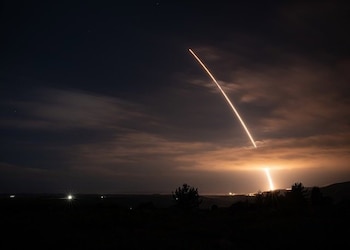
Carney destacó que, pese a los intentos diplomáticos, Irán “no desmanteló por completo su programa nuclear, no ha detenido todas las actividades de enriquecimiento ni ha puesto fin a su apoyo a grupos terroristas regionales que actúan como fuerzas subsidiarias”.
Finalmente, el primer ministro manifestó su solidaridad con el pueblo iraní “en su larga y valiente lucha contra el régimen opresivo de Irán”.
Ese mismo día, el presidente de Francia, Emmanuel Macron, advirtió que la escalada en Medio Oriente es “peligrosa para todos”. En un mensaje publicado en X, el mandatario señaló que el “desencadenamiento de la guerra entre Estados Unidos, Israel e Irán tiene graves consecuencias para la paz y la seguridad internacional”.
“La escalada actual es peligrosa para todos. Debe cesar. El régimen iraní debe comprender que ya no le queda otra opción que entablar negociaciones de buena fe para poner fin a su programa nuclear y balístico, así como a sus acciones de desestabilización regional”, sostuvo Macron.
(Con información de AFP)
Domestic,Politics,North America,Government / Politics
INTERNACIONAL
Stealth bombers landing at UK bases ‘in days’ after Trump pressures Starmer: report
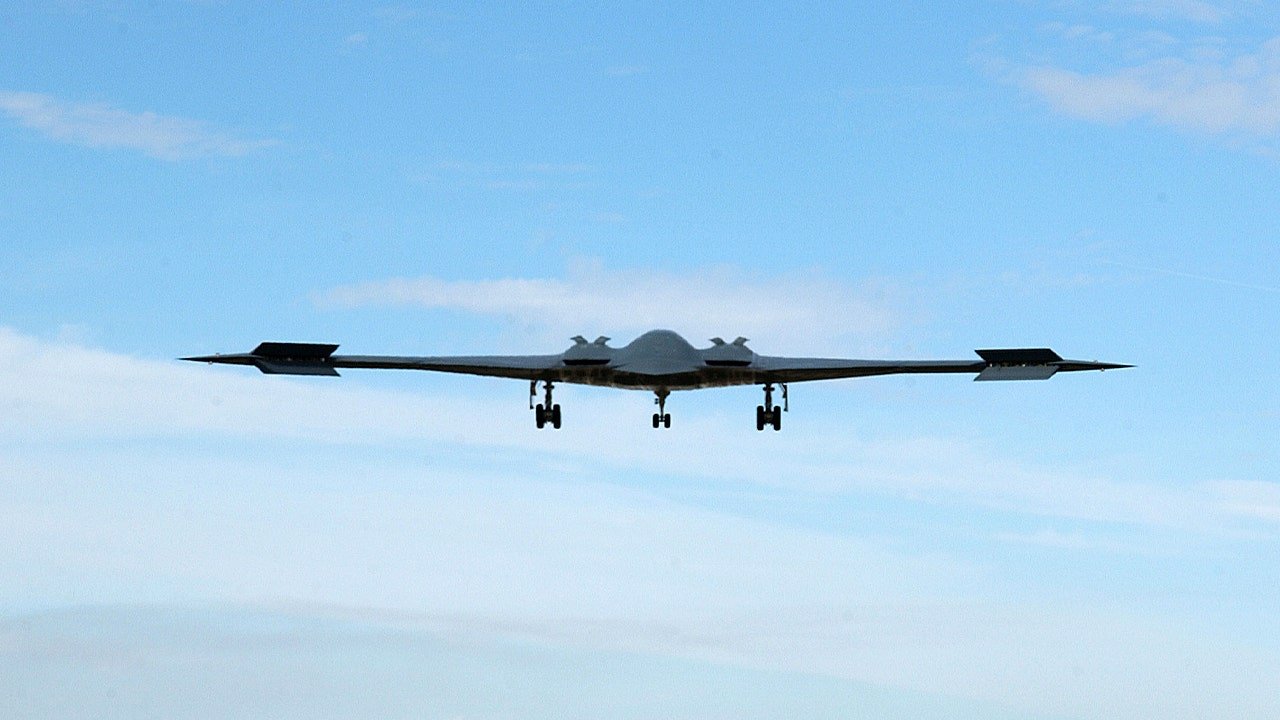
NEWYou can now listen to Fox News articles!
American stealth bombers are expected to land at U.K. military bases within days to join the U.S.-Israel campaign against Iran, according to reports.
Citing unnamed senior Western officials, The Telegraph reported Wednesday that air bases at Diego Garcia in the Indian Ocean and RAF Fairford in Gloucestershire are being readied for the arrival of B-2 Spirit stealth bombers — the $2 billion strategic bomber is also known as the world’s most expensive aircraft.
The bombers are understood to be landing at the U.K. bases «in a matter of days» as Washington intensifies operations in the region, the outlet reported.
As previously reported by Fox News Digital, the U.S. military used stealth B-2 bombers to strike Iranian ballistic missile facilities Feb. 28 as part of the launch of Operation Epic Fury.
Diego Garcia is a strategic Indian Ocean base hosting 2,500 US military personnel. (Reuters)
U.S. Central Command (CENTCOM) confirmed that B-2 stealth bombers, which were equipped with 2,000-pound bombs, struck Iranian «hardened» ballistic missile sites.
The U.S. was cleared to use British bases for limited strikes on Iran’s missile capabilities on Feb. 29 after Prime Minister Keir Starmer signed off on the plan, and while U.K. Defense Secretary John Healey stated Britain had «stepped up alongside the Americans.»
Starmer said the authorization was granted to protect U.K. and U.S. allies as the conflict escalated. He had previously said he would not allow American forces to use U.K. bases for offensive operations in the region.
Tensions have since been heightened in the U.K. by security incidents in Cyprus. RAF Akrotiri, a key British military base on the island, was struck by a suspected drone on March 2, causing minor damage.
IRAN’S DRONE SWARM ATTACKS UNLEASH ‘EXPONENTIAL COSTS’ ON US, PROLONGING WAR: ‘ASYMMETRIC CAPABILITY’

Several B-2 Spirit Stealth Bombers are seen on a runway at the Whiteman Air Force Base. (Whiteman Air Force Base)
The unmanned aircraft was reported to resemble an Iranian-made Shahed drone, similar to models used by Russia in Ukraine and by Tehran’s regional proxies.
The Ministry of Defense said force-protection measures were at the «highest level» and that the base had taken steps to defend personnel. About 4,000 service members and their families are based at RAF Akrotiri.
The U.S. State Department raised its travel advisory for Cyprus to Level 3, urging Americans to reconsider travel because of the threat of armed conflict and limited consular assistance in parts of the country.
Non-emergency embassy staff and family members were authorized to leave. Officials said the advisory change reflected adjustments in embassy operations rather than a direct change in underlying risk.
EX-CENTCOM CHIEF DETAILS ‘EXQUISITE INTELLIGENCE’ BEHIND IRAN STRIKES, SAYS NEXT STEPS HINGE ON ‘MISSILE MATH’

President Donald Trump blasted British Prime Minister Keir Starmer March 3, 2026, saying «this is not Winston Churchill we are dealing with,» amid a lack of support for the United States’ and Israel’s joint military operation against Iran. (Jim Lo Scalzo/EPA/Bloomberg via Getty Images ; PA Images via Getty Images ; Jonathan Brady/POOL/AFP via Getty Images)
CLICK HERE TO DOWNLOAD THE FOX NEWS APP
Trump had called Britain «uncooperative» and slammed Starmer as «not Winston Churchill» after Starmer initially rebuffed a U.S. request to use U.K. bases to attack Iran, according to The Associated Press.
Trump has also condemned Britain’s agreement to hand over the Chagos Islands, home to the Diego Garcia base, to Mauritius.
war with iran,middle east,iran,uk politics,donald trump,military tech,bombings
INTERNACIONAL
Unearthed video shows Dem candidate supporting ‘reallocation’ of police funding to social service programs
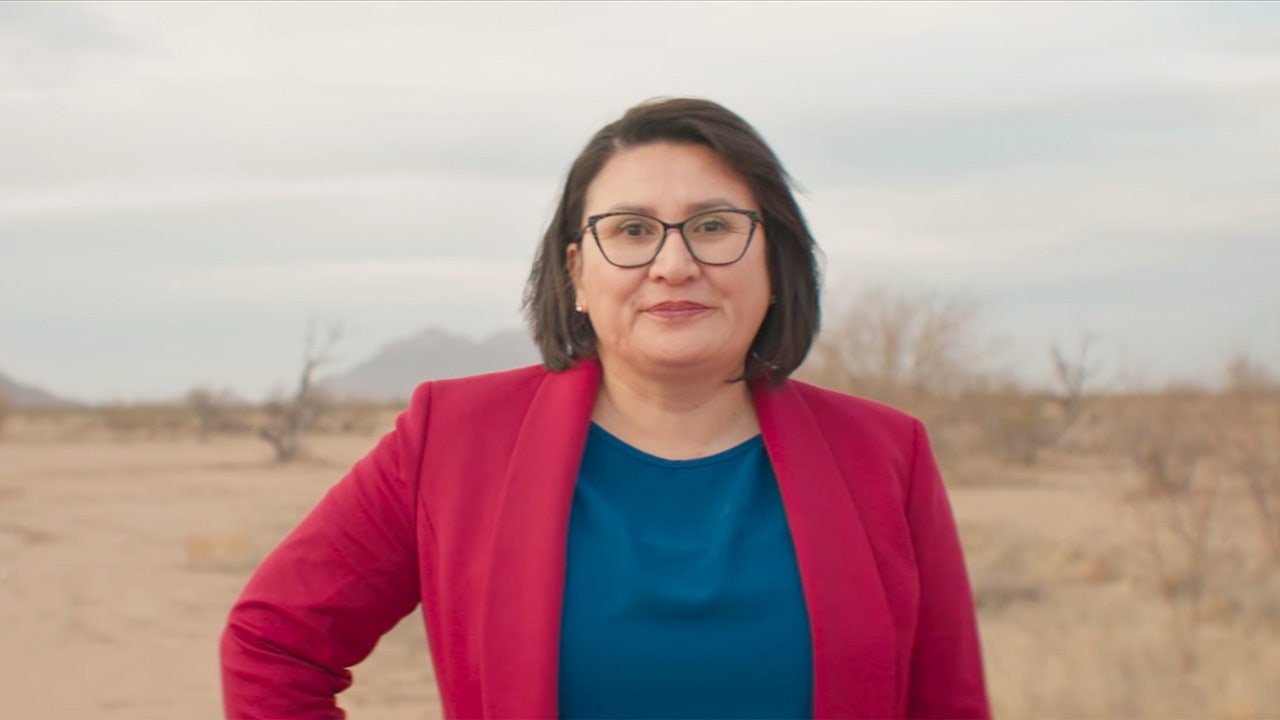
NEWYou can now listen to Fox News articles!
A Democrat running for Congress in one of the most competitive seats in the country once said she would combat systematic racism by redirecting law enforcement funding when asked if she would «defund the police» in 2020.
«I support the reallocation of funding to programs that would allow people to live their best lives,» JoAnna Mendoza, a Marine veteran, told the Arizona Clean Elections Commission and Arizona Capitol Times at a town hall event.
«Such as social service programs. Such as housing, public education, healthcare, ensuring that we are addressing economic stability and environmental safety.»
JoAnna Mendoza, a candidate for Congress, is running in one of the country’s most competitive races in 2026. (Joanna Mendoza for Congress/YouTube screenshot)
Mendoza, who is running to represent Arizona’s 6th Congressional District, denied ever supporting defunding the police, according to her campaign.
«Jo Mendoza has been on the record for years that police need MORE resources to do their jobs – not less – including body cameras and training. And she has repeatedly stated that she does not support defunding the police,» Mendoza’s campaign said in a statement to Fox News Digital.
«Any other assertion is categorically false, a lie and a political smear from D.C. hacks hoping to save Juan Ciscomani from an early retirement,» the campaign said, referring to the GOP incumbent Mendoza is running against.
Mendoza did not clarify what she had meant by the 2020 statement. However, her campaign pointed to other comments she made in 2020.
«I do not support defunding the police. Police officers are being asked to do too much. They’re being asked to address issues because of the lack of resources in our communities,» Mendoza said in another virtual event that year.
The Republican National Committee slammed Mendoza in a statement to Fox News Digital.
«There’s no way for JoAnna Mendoza to spin her extreme anti-police views, and Arizonans will know that she sides with dangerous criminals over them,» Nick Poche, a spokesperson for the RNC, told Fox News Digital.
The «defund the police» platform, which at the time was championed by several progressive Democrats, has aged poorly, leading Republicans and Democrats to view mere mentions of the phrase as a political liability in 2026.
The movement first burst onto the scene through the outrage after the death of George Floyd, a Black Minnesota resident who died after a police arrest in which an officer pinned him to the ground by placing a knee on his neck for an extended period.
His death sparked an uproar in cities across the country over racism in law enforcement and whether police in America could do more to avoid violence during arrests.
DEMOCRATS WORRY ‘ABOLISH ICE’ SLOGAN WILL BACKFIRE POLITICALLY LIKE ‘DEFUND THE POLICE’ DID

Demonstrators carry a banner during an «I Can’t Breathe» Silent March For Justice in Minneapolis March 7, 2021. (Emilie Richardson/Bloomberg via Getty Images)
Although the outrage over Floyd eventually subsided, many of the calls to divert resources away from police persisted as a Democratic platform, leading some cities like Minneapolis and Austin, Texas, to reduce their police budgets.
However, the movement began to draw ire from Democrats who feared the party had taken a stance that could be considered at odds with community safety and worsen their odds at the ballot box.
Rep. Jim Clyburn, D-S.C., the House Majority Whip under U.S. House Speaker Nancy Pelosi, D-Calif., in 2021, said the phrase was «cutting the throats of the party.»
«We keep making that mistake. This foolishness about you got to be this progressive or that progressive,» Clyburn said.
TENNESSEE CANDIDATE BLASTS DEM OPPONENT’S ‘UNACCEPTABLE’ TWEETS CALLING TO DISSOLVE NASHVILLE POLICE
Other Democratic strategists, such as James Carville, have also condemned the platform.
Carville called the slogan «the three stupidest words in the English language» in interviews in 2024 and went as far as suggesting the slogan could have led to the loss of Vice President Kamala Harris in her bid against Donald Trump.
«We could never wash off the stench of it,» Carville added.
TLAIB-BACKED SENATE CANDIDATE IN THE HOT SEAT AFTER DELETING ‘DEFUND THE POLICE’ SOCIAL MEDIA POSTS
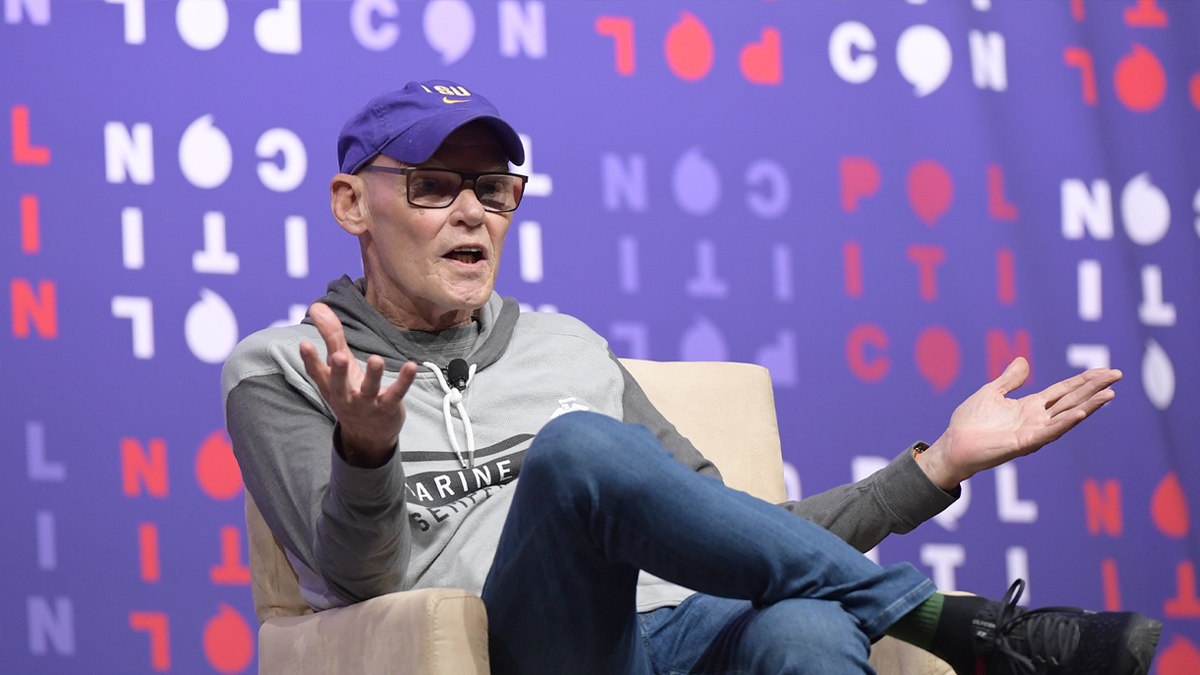
James Carville speaks onstage during Politicon at Music City Center in 2025. (Jason Kempin/Getty Images for Politicon)
Mendoza faces a tough race in Arizona’s 6th Congressional District. Ciscomani, the seat’s current incumbent, narrowly won election in 2024 in a 50%-47.5% victory over Democrat challenger Kirsten Engel.
The district is listed among the Cook Political Report’s most competitive races in 2026, earning one of the 18 seats with a «toss-up» designation.
CLICK HERE TO DOWNLOAD THE FOX NEWS APP
Poche believes Mendoza’s previous comments have just made her bid against Ciscomani harder.
«If the Democrats think a defund-the-police radical can beat him, they’re just plain stupid,» Poche said.
congress,police and law enforcement,politics,democrats elections,arizona,elections

 POLITICA2 días ago
POLITICA2 días agoPuertas adentro, Villarruel explotó: «El esfuerzo no lo hizo la política» y demolió el relato económico de Milei

 CHIMENTOS3 días ago
CHIMENTOS3 días agoPampita se mudó a un castillo francés de detalles alucinantes: «1000 metros, 14 ambientes, vale 11 millones de dólares»

 CHIMENTOS3 días ago
CHIMENTOS3 días agoEl drama que vive Oriana Sabatini a horas del nacimiento de su hija con Paulo Dybala: se complicó la salud de su abuela de 90 años













